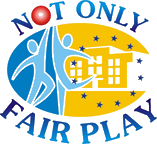
- Home
- Best
Practices - Toolkits
How to ... - Sport
Events - Guidelines
- Information
& Contacts - Project Management
A collection of student stories and initiatives about sport.
This section offers access to a collection of toolkits to promote sport at school.
-
 Physical Education Teachers
They are the main point of reference for students at school
Physical Education Teachers
They are the main point of reference for students at school
-
 Teachers
Teachers of all subjects can contribute to promote sport at school
Teachers
Teachers of all subjects can contribute to promote sport at school
-
 School Directors
Their support is a key element to promote sport at school
School Directors
Their support is a key element to promote sport at school
-
 Resources
A database of resources for teachers, PE teachers and school directors for the promotion of sport at school.
Resources
A database of resources for teachers, PE teachers and school directors for the promotion of sport at school.
Sporting events are organised in each partner country
Guidelines for policy makers willing to raise awareness on the importance of promoting sport in schools
Events
The Not Only Fair Play project has been promoted through conferences and articles.
Partnership
-
 Contractual Partners
From this section it is possible to access a description of each contractual partner of the Not Only Fair Play project.
Contractual Partners
From this section it is possible to access a description of each contractual partner of the Not Only Fair Play project.
-
 Schools
From this section it is possible to access information about the schools involved in the Not Only Fair Play Project in the 9 European countries involved.
Schools
From this section it is possible to access information about the schools involved in the Not Only Fair Play Project in the 9 European countries involved.
-
 Associated Partners
A number of associated partners officially joined the project in order to ensure the project sustainability by continuing to use the project deliverables over the next years.
Associated Partners
A number of associated partners officially joined the project in order to ensure the project sustainability by continuing to use the project deliverables over the next years.
This section of the Not Only Fair Play portal provides administrative information for the project contractual partners and for the European Commission, and is password protected.
Work in Progress
Homepage > Project Management > Work in Progress > Report Form

This section allows a constant communication and sharing of information among the project partners as far as the activities for the different intellectual outputs are concerned.
Each project partner uploads to this section on a three month basis.
Back to the Work in Progress List
 Partners' Institution:
Partners' Institution: Project's period (from/to):
Project's period (from/to): Objectives of activities carried out:
Objectives of activities carried out:The project partners will cooperate in the development of three toolkits.
1) The first toolkit will be addressed to physical education teachers in secondary schools.
The toolkit will contain guidelines and teaching sources on the following topics:
- Strategies to motivate students who are usually not involved in physical education activities.
- Sport as a mean to promote social inclusion.
- Promotion of an ethical approach to sport.
- Promotion of less popular sports
2) The second toolkit will be addressed to teachers of all subjects in secondary schools.
The toolkit will contain guidelines and teaching sources on the following topics:
- Strategies to motivate students who are only interested in sport to successfully balance study and sport.
- Strategies to integrate sport and healthy lifestyle approaches into the students’ educational pathways. This may include how to teach curricular lessons through sport related activities (e.g. Trekking for scientific lessons, Sport events to teach history or culture etc.)
- Strategies to use sport as a mean to promote the acquisition by students of transversal skills (e.g. communication, learning to learn, entrepreneurship etc.)
3) The third toolkit will be addressed to school directors.
The toolkit will contain guidelines on:
- The importance of promoting sport at school.
- Integration of sport into the curricular activities
- Sport as a mean for social inclusion
- Balance sport and study at school
 Description of activities carried out:
Description of activities carried out:Both toolkits are developed and uploaded on the portal.
FDCBPCS has also provided the BG translations of all toolkits developed by the partnership.
With regard to the toolkits for policy makers FDCBPCS has developed in EN the steps that have been appointed to us at the third partnership meeting and after discussion with all partners in the partner forum the texts have been enriched with the partners' suggestions and resources. Both toolkits are translated in Bulgarian.
 Outcomes:
Outcomes:Toolkits for policy makers developed and available already in Bulgarian
 Evaluation of the work undertaken:
Evaluation of the work undertaken: